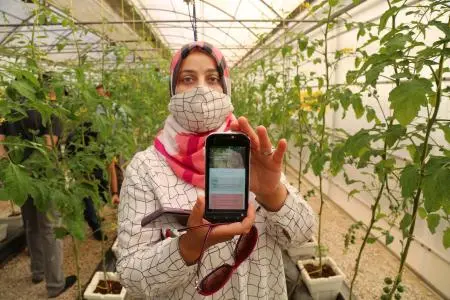PHOTO
Dubai, UAE: – The International Center for Biosaline Agriculture (ICBA) has demonstrated the beta version of an AI-powered mobile app for detecting plant disorders to agricultural researchers and specialists from the public- and private-sector organizations in the UAE.
Twenty-two participants from different institutions, including the Ministry of Climate Change and Environment, the Abu Dhabi Agriculture and Food Safety Authority, the Environment Agency - Abu Dhabi, Dubai Municipality, Sharjah Municipality, and Ras Al Khaimah Municipality attended a hands-on workshop on 7-8 December 2021 to learn how the mobile app can be used to collect data related to plant disorders.
Organized under the project titled “Developing a user-friendly mobile application for smallholder farmers to detect plant disorders”, the workshop was conducted by scientists from ICBA and the University of Barcelona, Spain.
Dr. Tarifa Alzaabi said: “We are delighted to showcase the beta version of this mobile app in the UAE - a country which is at the forefront of innovation in different sectors, including agriculture. The development of the mobile app is aligned with our research focus on data-driven agriculture and use of artificial intelligence to improve farming. Currently, we have a number of projects focused on using drones, internet of things and smart systems. We hope that once the mobile app is released in the UAE and other countries, it will help agricultural researchers, specialists and farmers to detect plant disorders at early stages and thus take necessary actions to minimize yield losses.”
For his part, Dr. Jose Luis Araus, Professor of Plant Physiology at the University of Barcelona, Spain, commented: “The Arabian Peninsula and the Mediterranean basin share common challenges resulting from climate change, with increasing droughts and salinization being among the most relevant for the agriculture of these countries. ICBA and the University of Barcelona have been collaborating for the last six years to develop monitoring techniques to allow more efficient saline agriculture for different species, including date palm, quinoa, Salicornia, and cereals. For the last year and a half, both teams have been developing a deep learning-powered app for mobile phones aimed at the automatic identification of pests and deficiencies in different horticultural species and quinoa.”
Dr. Henda Mahmoudi, Plant Physiologist at ICBA, remarked: “Estimates show that annual crop losses due to pests and diseases range between 20 percent and 40 percent, undermining rural livelihoods, national economies, and food security. Therefore, intelligent systems like the mobile app that we are developing with our partners at the University of Barcelona can help farmers make prompt diagnoses and facilitate an effective response to plant diseases and pest attacks at their early stages.”
One of the participants, Eng. Mohamed Ali Al Abdouli, Agricultural Extension Officer at the Abu Dhabi Agriculture and Food Safety Authority, said: “I thank ICBA for this great opportunity to attend such an important training workshop where we discussed how to use the mobile application to help farmers. Such tools are very much required to guide farmers and help them protect their crops. There is great potential to collaborate on this aspect.”
The project currently targets farmers in Egypt, Morocco, Tunisia, and the UAE. Later, the mobile app will be rolled out in other countries as well. It is also being customized for each country, and the final version will be available in three languages: Arabic, English, and French.
-Ends-
Press enquiries:
Mr. Showkat Nabi Rather, ICBA: s.rather@biosaline.org.ae , or +971 55 137 8653
About ICBA
The International Center for Biosaline Agriculture (ICBA) is a unique applied agricultural research center in the world with a focus on marginal areas where an estimated 1.7 billion people live. It identifies, tests and introduces resource-efficient, climate-smart crops and technologies that are best suited to different regions affected by salinity, water scarcity and drought. Through its work, ICBA helps to improve food security and livelihoods for some of the poorest rural communities around the world.
© Press Release 2021
Disclaimer: The contents of this press release was provided from an external third party provider. This website is not responsible for, and does not control, such external content. This content is provided on an “as is” and “as available” basis and has not been edited in any way. Neither this website nor our affiliates guarantee the accuracy of or endorse the views or opinions expressed in this press release.
The press release is provided for informational purposes only. The content does not provide tax, legal or investment advice or opinion regarding the suitability, value or profitability of any particular security, portfolio or investment strategy. Neither this website nor our affiliates shall be liable for any errors or inaccuracies in the content, or for any actions taken by you in reliance thereon. You expressly agree that your use of the information within this article is at your sole risk.
To the fullest extent permitted by applicable law, this website, its parent company, its subsidiaries, its affiliates and the respective shareholders, directors, officers, employees, agents, advertisers, content providers and licensors will not be liable (jointly or severally) to you for any direct, indirect, consequential, special, incidental, punitive or exemplary damages, including without limitation, lost profits, lost savings and lost revenues, whether in negligence, tort, contract or any other theory of liability, even if the parties have been advised of the possibility or could have foreseen any such damages.




















